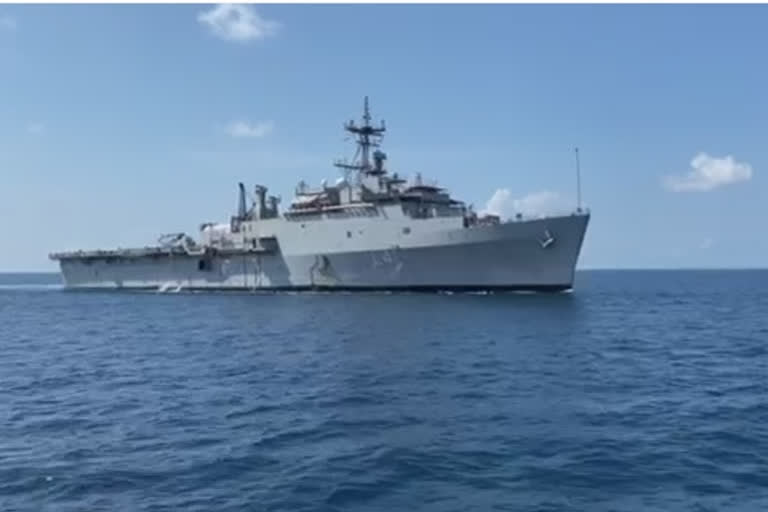Hyderabad: Against the backdrop of the continuing stand-off between India and China over the LAC (line of actual control) in the Ladakh region where a disengagement process is underway, Delhi it is understood, is likely to invite Australia to join the tri-service Malabar naval exercises to be held towards the end of the year.
Media reports referred to a meeting held in the Indian Ministry of Defence on Friday (July 19) that reviewed this matter and the formal decision to invite Australia - to join India, USA and Japan is expected to be formalized soon. In essence, the Quad would be given a more operational contour than what it now represents – a deliberative body among officials of the four nations.
While the symbolism and signalling inherent in these four nations moving towards a certain degree of maritime/naval cooperation is significant, it would be misleading to over-interpret the effect of a likely Quad exercise on what is happening at the LAC. On current evidence, the resolution of the tension across the LAC would remain a bi-lateral matter between India and China and is likely to be a long-drawn-out affair.
The comparison of comprehensive national capability between India and China across the more relevant tangible elements of ‘power’ – be it collective resolve, economic-fiscal indicators or techno-military prowess would tilt in Beijing’s favour – except for one domain – the maritime. Here geography and the evolution of India’s proven naval capability over the last five decades give Delhi an edge – but only for a brief period since Beijing is closing the gap rapidly.
Also Read: India will cross the Rubicon if Australia joins 'Malabar 2020' as it waits political nod
Yes, in recent years China has expressed its own concerns in the maritime domain – the Malacca dilemma - in relation to the perceived American dominance of the global oceans and has moved with admirable determination to redress the naval power imbalance. The growth of the PLA Navy over the last 25 years is extraordinary and could be compared with the manner in which the Soviet navy was nurtured by the legendary Admiral Gorshkov during the Cold war decades.
Currently, China poses two challenges to the global community – the first being the COVID 19 pandemic and the degree to which Beijing is willing to play a truly constructive role; and the second strand that affects some nations is the creeping assertiveness that the Xi Jinping regime has adopted both in relation to land borders/ territory (Taiwan) and maritime claims; as also the consolidation of the BRI (Belt and Road Initiative). The sub-text is the growing anxiety in many capitals that China is moving ruthlessly to reach the global number ONE spot by 2049 – the centenary of the birth of the Chinese communist state in 1949 –and impose its own version of Pax Sinica.
The maritime domain-specific to the Indo-Pacific region offers a certain leverage that has potential in the long term management of the China challenge and this is where the nascent Quad acquires its relevance. Yet it merits repetition that this is a work in progress with many complex contradictions in relation to the entity that is China and its current global foot-print in the trade-technology-infrastructure sectors.
Even among the Quad nations, their bilateral relationship with China is contradictory and being pursued on many tracks and not all of them are state-specific; meaning that the global market dynamic and technological inter-dependencies have erased the possibility of an easy binary option. While the US-China contestation is at a higher level of strategic relevance, for Japan, India and Australia the choices apropos Beijing are more tangled since each of them have robust trade and economic relationship with China that cannot be jettisoned in an impulsive manner.
The same is true for China which cannot proceed on the assumption that it will restrict/ shrink its ties with the Quad members and other like-minded nations and remain cloistered with ‘all-weather’ friends like Pakistan, North Korea and perhaps Iran. Even Russia, while being empathetic to China is unlikely to accept the status of a junior partner subsumed in a China-centric world order despite being a relative economic subaltern.
Also Read: India favourably considering Australia's entry into Malabar exercise: Sources
As and when a more stable post-pandemic global environment comes into effect and there is visible global economic recovery, a long term Quad blue-print with a reasonably clear set of operational objectives will have to be evolved – consensually. Acquiring and sustaining effective naval capability across the spectrum is an expensive proposition and each nation will have to arrive at its own cost-benefit analysis about how much they wish to invest in this nascent maritime collective.
The naval/maritime domain offers a range of options for Quad cooperation and inter-operability in the medium term and one hopes that Indonesia and other ASEAN nations could also be part of this effort. The management of the global commons in accordance with international law and customary practice is a stated objective and Prime Minister Modi has often dwelt on this tenet in different international meetings.
Paradoxically while the USA upholds this principle, it is not a signatory to the UN Law of the Seas (UNCLOS) but adheres to the spirit of the treaty. In contrast, China is a signatory to UNCLOS but has chosen to reject the ICJ (International Court of Justice) ruling based on this treaty in relation to the SCS (South China Sea). Hence ensuring compliance by China will be an arduous task and will call for a mix of deft diplomacy and the suasive power of naval capabilities.
This is the long term challenge for the Quad even as it is cohering and would correspond to the Modi enunciation of SAGAR – security and growth for all – in the maritime domain.


